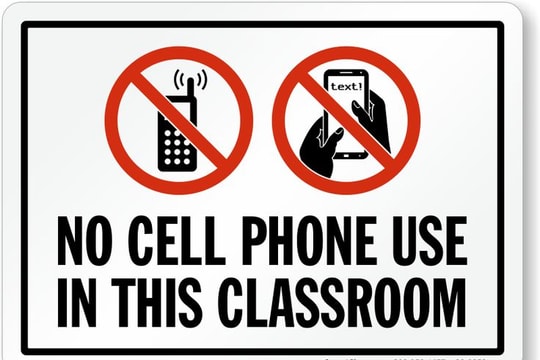The 'revolution' of banning mobile phones in schools in Europe
In recent years, a wave of bans on mobile phones in schools has been spreading across Europe. In this region, more and more schools have decided to say "no" to mobile phones during class. Is this a "revolution" in education?
The decision to ban mobile phones at Calvijn College, one of the first schools in the Netherlands to do so, has had surprising results. After four years, the school has recorded a marked improvement in the quality of learning, increased social interaction between students and a healthier learning environment.
Six years ago, when the idea of banning mobile phones at Calvijn College was proposed, it was like an earthquake that shook the entire student community here. Many people were surprised and strongly opposed, thinking that the ban was too harsh and would affect student life. However, the school's administrators still firmly implemented this decision, opening up an interesting experiment.
.jpg)
When making the decision to ban phones, Jan Bakker, the school's chairman, whose pupils range in age from 12 to 18, said: "People asked us if we thought we were living in the 19th century."
While the idea has received a majority of support, about 20% of parents, teachers and students are strongly opposed. Some parents are concerned about losing contact with their children, while a minority of teachers believe that instead of avoiding it, schools should find ways to integrate technology more effectively into the learning process.
However, in the face of students' over-reliance on phones, administrators have decided to implement this measure. Mr. Bakker shared: "When walking through the hallways and schoolyards, we easily see students glued to their phone screens. Lively conversations and physical activities seem to have become strange. This shows that we are gradually losing important social values."
Four years ago, Calvijn College pioneered the ban on mobile phones in the Netherlands. Now, its bold decision is no longer alone. As the new school year begins across Europe, more and more schools are adopting similar measures.
In France, 200 secondary schools have been testing the ban, while French-speaking primary schools in Wallonia and Brussels (Belgium) have officially implemented the regulation. Hungary even issued a decree requiring all schools to confiscate students' phones and smart devices at the beginning of class.
Unlike their neighbors, Italy and Greece have taken a softer approach to the issue of mobile phone use in schools. In both countries, students are still allowed to carry their phones with them throughout the school day. However, to ensure that the learning process is not affected, schools have issued strict regulations prohibiting the use of phones during class. Phones must be turned off or put on silent mode and stored in school bags or personal lockers during class time.
At Calvijn College, the phone ban has created a wave of change. Since the policy was implemented, forcing students to leave their phones at home or lock them up during class, the school has seen a noticeable shift in school culture.
"We've seen an incredible change," said Bakker. "What we lost when students were so dependent on their phones has now come back. They're playing and talking to each other more than ever. And the best part is that the lessons are more focused."
The success of Calvijn College in banning mobile phones created a domino effect. Schools across the Netherlands began to look into the model. By January 2024, the government had officially stepped in, recommending a ban on smart devices such as mobile phones, tablets, and smartwatches in most secondary schools. The trend has even extended to primary schools, signaling a major shift in the country’s approach to education.
Late last year, as Dutch secondary schools were making the move to ban phones, researchers at Radboud University seized the opportunity to conduct a comprehensive study. They surveyed hundreds of students, parents, and teachers at schools undergoing the change. By comparing the results of the surveys before and after the ban, the researchers hoped to find out the specific effects of the new policy on the school environment.
The results of the study by Dr. Loes Pouwels, one of the researchers, showed a significant change. About 20% of students admitted that they were more focused on their lessons after the ban on mobile phones. Teachers even commented that students became more attentive and actively engaged in the learning process. This shows that limiting mobile phone use has had a positive impact on students' cognitive abilities.
In addition to improving concentration, banning phones has also had a positive impact on peer relationships. Many students reported spending more time chatting, playing with friends, and participating in extracurricular activities. This not only helps them build stronger relationships but also reduces cyberbullying.
While the phone ban has had many positive effects, not all students agree. Three months after the ban, about 40% of students said that not using their phones helped them enjoy their breaks better. However, 37% of students said they missed the convenience of their phones.
One student told researchers: “I feel forced to communicate when I don’t want to, and this happens often.” This suggests that adapting to a phone-free environment takes time and a change in routine.
At Calvijn College, officials have no doubt that the ban is positive. When the plan was first implemented, there was talk of allowing older students to use phones in school. But the idea has been abandoned after the changes they have seen. “That discussion has disappeared. Nobody talks about it anymore,” Mr. Bakker said.
Instead of initial concerns, the school is now filled with pride. The decision to restrict mobile phones has put the school at the forefront of modern education trends. "In the past, we were often told that we were behind the times, that we were going back in time, but now our success proves otherwise. The relentless efforts have paid off," said the school's president, Mr. Bakker.

.jpg)




